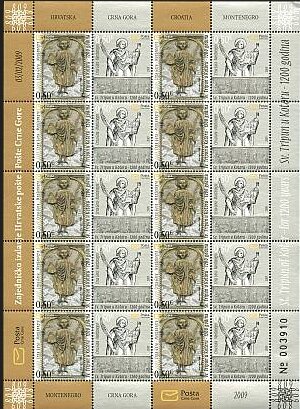Full Pane: 1200 Years of St. Tripun in Kotor (Montenegro 2009)
1200 Years of St. Tripun in Kotor (Montenegro 2009)
03 February (Montenegro ) within release History Montenegro goes into circulation Full Pane 1200 Years of St. Tripun in Kotor face value 20*0.50 Euro
| Full Pane 1200 Years of St. Tripun in Kotor in catalogues | |
|---|---|
| Michel: | Mi: ME 196-197KB |
Full Pane is square format.
Also in the issue History Montenegro:
- Stamp - St.Tripun-Kotor face value 0.50;
- Stamp - St.Tripun-Kotor face value 0.50;
- Full Pane - 1200 Years of St. Tripun in Kotor face value 20*0.50;
- Se-tenant - 1200 Years of St. Tripun in Kotor face value 2*0.50;
Full Pane 1200 Years of St. Tripun in Kotor it reflects the thematic directions:
An anniversary is the date on which an event took place or an institution was founded in a previous year, and may also refer to the commemoration or celebration of that event. For example, the first event is the initial occurrence or, if planned, the inaugural of the event. One year later would be the first anniversary of that event. The word was first used for Catholic feasts to commemorate saints. Most countries celebrate national anniversaries, typically called national days. These could be the date of independence of the nation or the adoption of a new constitution or form of government. The important dates in a sitting monarch's reign may also be commemorated, an event often referred to as a "Jubilee".
Architecture (Latin architectura, from the Greek ἀρχιτέκτων arkhitekton "architect", from ἀρχι- "chief" and τέκτων "builder") is both the process and the product of planning, designing, and constructing buildings and other physical structures. Architectural works, in the material form of buildings, are often perceived as cultural symbols and as works of art. Historical civilizations are often identified with their surviving architectural achievements.
A Christian is a person who follows or adheres to Christianity, a monotheistic Abrahamic religion based on the life and teachings of Jesus Christ. Christians form the largest religious community in the world. The words Christ and Christian derive from the Koine Greek title Christós (Χριστός), a translation of the Biblical Hebrew term mashiach (מָשִׁיחַ) (usually rendered as messiah in English). While there are diverse interpretations of Christianity which sometimes conflict, they are united in believing that Jesus has a unique significance. The term Christian used as an adjective is descriptive of anything associated with Christianity or Christian churches, or in a proverbial sense "all that is noble, and good, and Christ-like." It does not have a meaning of 'of Christ' or 'related or pertaining to Christ'.
n Christian belief, a saint is a person who is recognized as having an exceptional degree of holiness, likeness, or closeness to God. However, the use of the term saint depends on the context and denomination. In Catholic, Eastern Orthodox, Anglican, Oriental Orthodox, and Lutheran doctrine, all of their faithful deceased in Heaven are considered to be saints, but a selected few are considered worthy of greater honor or emulation. Official ecclesiastical recognition, and veneration, is conferred on some denominational saints through the process of canonization in the Catholic Church or glorification in the Eastern Orthodox Church after their approval.In many Protestant denominations saint refers broadly to any holy Christian, without special recognition or selection.




